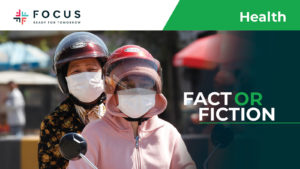During the initial breakout of the Covid-19 pandemic, conflicting reports about the effectiveness of protective masks confused people around the world.

The Myth:
Wearing a mask can help protect you from being infected with the coronavirus that causes Covid-19.
Fact or Fiction?
Fact
What You Need to Know:
From the very beginning of the Covid-19 outbreak, there have been many health and news outlets giving conflicting advice on a variety of topics. None has been more widely debated than whether wearing protective masks are an effective way to help stem the spread of the disease.
Though initial reports of a new respiratory disease in China quickly became world news, there was not a sense of fear or panic in Western countries. Similar recent disease outbreaks, SARS and MERS, had remained mostly contained to Asia and the Middle East. It was not until countries in the West, like Italy, saw large numbers of infection and death that the push for preventative measures became a top priority.
Masks of all sorts quickly sold out in nations across the globe, with many retailers taking advantage of the situation and pricing their products dozens of times more expensive than before the outbreak. Many health care providers were left low on supplies due to the demand.
This rush happened despite the fact that there was no agreed position on the effectiveness of wearing masks, with the Centers for Disease Control (CDC) and the World Health Organization (WHO) giving advice that runs contrary to the other.
According to their website, “CDC recommends wearing cloth face coverings in public settings where other social distancing measures are difficult to maintain (e.g., grocery stores and pharmacies) especially in areas of significant community-based transmission… to slow the spread of the virus and help people who may have the virus and do not know it from transmitting it to others.”
The WHO has reached a different conclusion, however, stating on their website, “there is currently no evidence that wearing a mask (whether medical or other types) by healthy persons in the wider community setting, including universal community masking, can prevent them from infection with respiratory viruses, including COVID-19.”
So, who are we to believe?
An article published in the medical journal The Lancet has made the best case for masks after analyzing data from 172 studies in 44 different countries. The group of scientists found that the “use of face masks was protective for both health-care workers and people in the community exposed to infection…lending support to face mask use irrespective of setting.”
In addition to these findings, a study conducted at the University of Hong Kong tested the efficacy of masks in reducing the transmission of the coronavirus between hamsters. The rodents were chosen as test subjects due to their immune response and symptom display being similar to humans. Cages of infected and healthy hamsters were placed in proximity with and without face masks placed between them.
The study found that infected hamsters were able to pass the disease to healthy hamsters placed in unprotected proximity at a rate of 66%. When masks were placed over only the healthy hamsters’ cage, the infection rate dropped to 33%. Placing masks over both cages further dropped the infection rate to 16.7%. While the study has not been peer-reviewed yet, it shows promising results on the effectiveness of wearing masks.
Coupled with social distancing and hygiene measures, the data shows that masks are clearly an effective tool in the fight against Covid-19.



